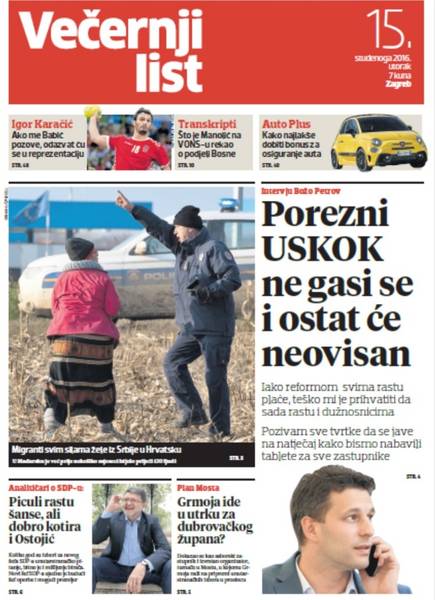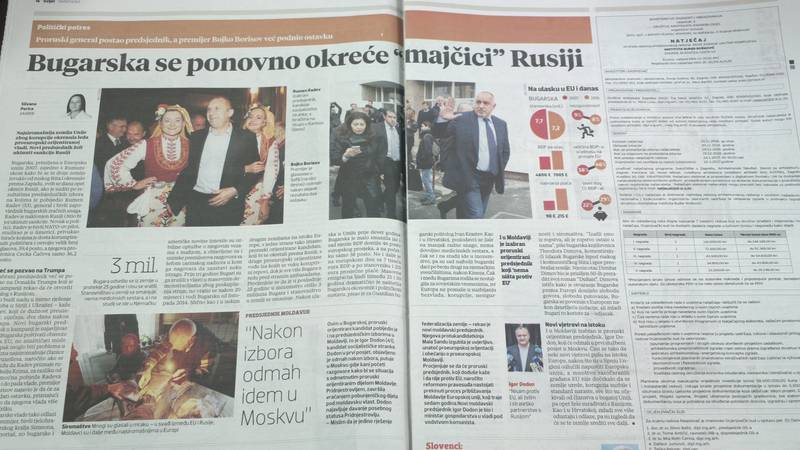Fear of a Major Shift in Geopolitics Reigns in the Balkans Following Trump's Win
Adelina Marini, November 15, 2016

Media in the countries of the former Yugoslavia continue to analyse the results of the presidential elections in the USA with opinions continuing to vary. In Croatia, the accent is on the expectations for a change in the political map of Europe, while in Serbia predominate analyses that are trying to calm down the hopes that Serbs have with the coming of Donald Trump to power. Within all this are entwined the presidential elections in Bulgaria. Today’s press also brings back the fear of a new migrant wave along the Western Balkans route.
“As if Trump was not enough” is the headline of a material in the Croatian Jutarnji list, which believes that the political map of Europe is changing not just because of the election of Trump, but also because of the results of elections in Bulgaria and Moldova. “Last week the Kremlin met with great joy Donald Trump’s victory in the American elections. [...] This, however, is not the only cause for the smile on Vladimir Putin’s face this week. On Sunday, there were elections held in Moldova – the poorest state in Europe – and Bulgaria – the poorest EU member. Citizens of both countries elected their presidents and in both cases they elected candidates, who are closer to the Kremlin, than to Brussels”, reports the newspaper.
Jutarnji also reminds that last week there was a vote of non-confidence against the government of Estonian PM Taavi Rõivas. The next day power was assumed by a party, which is presumed to be politically closer to the Kremlin. The new government did state, however, that nothing will change in the foreign and defence policy of Estonia. “Bulgaria once again turns to Mother Russia” is the headline of a lengthy material spread on two pages in today’s edition of the other most-circulated newspaper in Croatia, Vecernji list. “The poorest state in the Union, because of corruption, has turned its back to its pro-European oriented government. The new president wants to put an end to sanctions against Russia”, reads the opening of the material.
“Bulgaria, which entered the EU in 2007 together with Romania, so that the two countries could be extracted from the Russian shield and turn to the West, has recently turned back towards Russia, judging by the results of the presidential elections, which were won by Rumen Radev, a general and a former commander of Bulgarian Air Forces”, writes Silvana Perica. “The top of the Bulgarian government is being left by a colourful prime minister – former bodyguard to the Bulgarian tsar Simeon, athlete, but at the same time Bulgarian and American newspapers have printed abundant allegations of his connections to organised crime, and also there were recordings leaked of his conversations with the boss of customs control, in which the PM makes him stop an investigation”. Vecernji reminds that Boyko Borissov was removed from power three years ago because of the rise in electricity prices, but came back 20 months later. It also reminds that over the last 23 years the country was left by 3 million Bulgarians.
The most-circulated daily newspaper in Montenegro – Vijesti – publishes a commentary by the Deutsche Welle Bulgarian journalist Aleksandar Andreev. “Bulgaria is heading towards instability” is the headline of the material, which is placed in the most-read section with commentaries and analyses of the newspaper. “New instability at the border between Turkey and Europe, which is shaking in crises – this will be the result of the election victory of former general Rumen Radev at the presidential elections in Bulgaria. And not because Radev is pro-Russia oriented, but because over the next months the country will practically be left with no government. The far larger problem is the fact that Radev is inexperienced and nationalist oriented, as well as the fact that so far he has been totally politically helpless and colourless”, reports Andreev.
He believes that the general’s statements about who does Crimea belong to and the need for removing sanctions against Russia are politically naive and could be fully explained with his lack of political experience. “People who know him believe that the general, who has studied in the USA and has worked for NATO, who speaks English, German, and Russian fluently, has no intention of re-orienting Bulgaria’s foreign policy course and move it farther from the EU and NATO”, assures the analyst. Keeping in mind the geopolitical clashes in Montenegro, caused by Russia’s resistance to the accession of the small Balkan republic to NATO and the EU, it is easy to explain the interest in Montenegro towards any geopolitical change in its closest neighbourhood.
In Serbia, focus is entirely on Donald Trump and more specifically a return is noticed towards reason and realism. In a commentary for the Danas, Ivan Radak explains “Why not Trump”. “The people of Serbia are once again on the wrong side and proud of it”, writes the author. “While the rational world (how else to name those, who stand against totally unmeasured words and the behaviour of the future president of the USA) called out against him, a large portion of people here were actually against Hillary Clinton and her husband’s contribution to the bombing of Serbia”. Ivan Radak is more concerned about what Donald Trump did not say. “I get worried when someone wins an election with fast and big decisions (100 billion euro in investments over 10 years, better life in two, maximum three years). In this sense, Donald Trump was not that different from the ones we have here”, he writes and reminds that deregulation is what brought about the crisis.
In Politika, Doctor Zoran Milivojević also warns to be careful with hope. His focus, however, is on Kosovo and the hopes of Serbs that Trump coming to power will bring the return of Kosovo. There is no way this could happen, explains the retired diplomat. “The recognition of Kosovo’s independence by the USA and their main Western allies is a part of a wider geostrategic concept, which is part of the geopolitical interests of the Western alliance, headed by the USA, which would be difficult to alter without serious harm to this alliance. So such expectations by the Serbs are not real”, writes the analyst.

In Croatia, fears are coming back from a renewal of the migrant wave. Vecernji list reports in an editorial that the full feebleness of the EU can be seen mirrored in the swamp at Tovarnik. The newspaper reports on yesterday’s incident, where a group of migrants (mainly from Afghanistan and Pakistan) attempted to break through the Serbian blockade and enter Croatia. The attempt was unsuccessful, but the newspaper comments that the unpleasant sight of exhausted and freezing people, running away from war, carrying children in hands, bring back the memory of last year. At the moment, we are not even talking about a new migrant wave, but this is just so far. It is not clear when will Ankara implement its threats to end its agreement with the EU.
When this does happen, it will cause a new humanitarian catastrophe of unseen proportions. “Brussels, however, has not recovered from the Brexit yet, neither has it recovered from the coming to power of Donald Trump. Member states have no common strategy and are once more left to their own devices. The full feebleness of the EU is now seen mirrored at the Croatian-Serbian border”, reports the newspaper.
The largest changes in the battle against corruption in the last 15 years are expected in Serbia. Blic reports that a bundle of judiciary acts are expected to be presented to the Skupština today. Expectations are that the new changes will form a new body for battle against corruption within the Ministry of Internal Affairs. There will be special divisions opened in the high prosecution offices and courts, which are to handle corruption cases. The prosecution will have four such centres, which will deal with corruption. They will be based in Belgrade, Novi Sad, Niš, and Kragujevac. Courts will also have four centres. These will be the most serious changes in the last 15 years, comments Blic.
Translated by Stanimir Stoev
 Bakir Izetbegovic, Andrej Plenkovic | © Council of the EU
Bakir Izetbegovic, Andrej Plenkovic | © Council of the EU Aleksandar Vucic, Recep Tayyip Erdogan | © Serbian Presidency
Aleksandar Vucic, Recep Tayyip Erdogan | © Serbian Presidency Jean-Claude Juncker, Zoran Zaev | © European Commission
Jean-Claude Juncker, Zoran Zaev | © European Commission